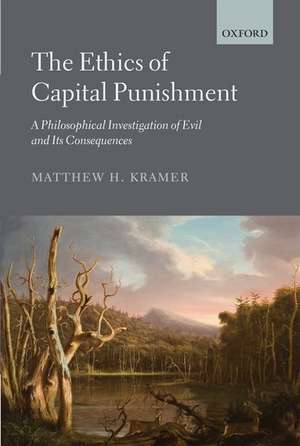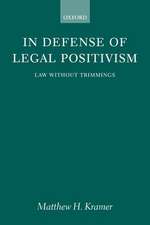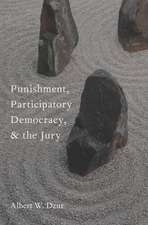The Ethics of Capital Punishment: A Philosophical Investigation of Evil and its Consequences
Autor Matthew H. Krameren Limba Engleză Hardback – 15 dec 2011
Preț: 733.34 lei
Preț vechi: 902.96 lei
-19% Nou
Puncte Express: 1100
Preț estimativ în valută:
140.32€ • 146.51$ • 116.14£
140.32€ • 146.51$ • 116.14£
Carte tipărită la comandă
Livrare economică 24-31 martie
Preluare comenzi: 021 569.72.76
Specificații
ISBN-13: 9780199642182
ISBN-10: 0199642184
Pagini: 366
Dimensiuni: 165 x 243 x 26 mm
Greutate: 0.71 kg
Editura: OUP OXFORD
Colecția OUP Oxford
Locul publicării:Oxford, United Kingdom
ISBN-10: 0199642184
Pagini: 366
Dimensiuni: 165 x 243 x 26 mm
Greutate: 0.71 kg
Editura: OUP OXFORD
Colecția OUP Oxford
Locul publicării:Oxford, United Kingdom
Recenzii
Hannah Arendt ends ^iEichmann in Jerusalem^r with a statement about the sentencing of Adolf Eichmann: "we find that no one, that is, no member of the human race, can be expected to want to share the earth with you." Kramer's excellent new book develops an original line of argument that echoes that Arendtian sentiment into what he calls the purgative justification for capital punishment....Kramer's book is a well-argued and inventive work that will generate new avenues of discussion in legal and moral philosophy.
Matthew Kramer's book ^iThe Ethics of Capital Punishment^r is a significant achievement. Not only does it offer a thorough and up-to-date discussion of traditional justifications for the death penalty, it also attempts to offer an alternative, novel justification for it, something that Kramer calls the purgative rationale. Although I am not entirely sympathetic to this aim, I think that carving out a new territory within this already crowded intellectual space is something which ought to be commended.
In this bold philosophical inquiry, Professor Matthew Kramer develops a justification for the death penalty as a sui generis concept: the purgative rationale. After grappling with and rebutting the standard justifications for capital punishment deterrence, retributivism, incapacitation, and denunciation Professor Kramer develops the purgative rationale, arguing that a community is tainted in other words, its moral integrity is lessened by the continuing existence of anyone who has perpetrated some especially hideous crimes.
Matthew Kramer's book ^iThe Ethics of Capital Punishment^r is a significant achievement. Not only does it offer a thorough and up-to-date discussion of traditional justifications for the death penalty, it also attempts to offer an alternative, novel justification for it, something that Kramer calls the purgative rationale. Although I am not entirely sympathetic to this aim, I think that carving out a new territory within this already crowded intellectual space is something which ought to be commended.
In this bold philosophical inquiry, Professor Matthew Kramer develops a justification for the death penalty as a sui generis concept: the purgative rationale. After grappling with and rebutting the standard justifications for capital punishment deterrence, retributivism, incapacitation, and denunciation Professor Kramer develops the purgative rationale, arguing that a community is tainted in other words, its moral integrity is lessened by the continuing existence of anyone who has perpetrated some especially hideous crimes.
Notă biografică
Matthew H. Kramer is Professor of Legal & Political Philosophy at the University of Cambridge; Fellow of Churchill College, Cambridge; and Director of the Cambridge Forum for Legal & Political Philosophy. He is the author of a dozen previous books and the co-editor of four other books.












